Identifying the problem with the “Sleeping Giants”
December 1, 2020
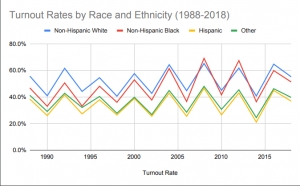
The turnout of the 2020 election cannot be determined by one factor such as the political affiliation of a racial demographic. Yet before the election, many speculated that Latino voters would be a large, primarily Democratic demographic. They have been referred to as the “Sleeping Giants” due to the low number of Latino votes in comparison to their population in previous elections. In a survey done by the Census Bureau’s Current Population Survey (CPS), Hispanics were the racial demographic least likely to vote for the past three decades.
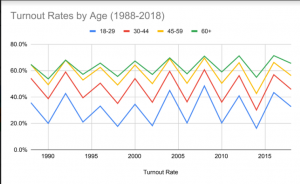
Like other racial demographics, there has not been a strong turnout among Latino voters under the age of 30. In terms of age demographics, the same survey by CPS shows that all voters ages 18-29 have been the least likely to turn out during elections.
As of 2020, Hispanics account for about 18% of the US’s population, or 59 million people. They are the second most populous race after White people who represent about 59%. This year, about 32 million Latinos voted in the election. Yet both Biden and Hillary Clinton received 66% of Latino votes in the 2020 and 2016 elections, respectively, despite there being an increase in Latino votes from 2016.
It is hard to say if there was a change, how major the change was and if the change for turnouts in racial and age demographics can be attributed to Latinos considering that few surveys have been done since the election.
The bigger question is: can Latinos be treated as one demographic?
First off, political divides are not only determined by race. Gender, age and religion should also be considered when looking at racial demographics. Statistically, women are less likely to vote in comparison to men in all racial demographics. Age, as mentioned before, is a universal demographic that younger voters are found to have a lesser turn out in terms of voting. Research has also shown that religion has shaped voters’ views and values, notably Christians being against certain laws favoring the LGBTQ+ community and legalizing abortions. Still, there is no evidence of an entire race demographic following the same religion in the US.
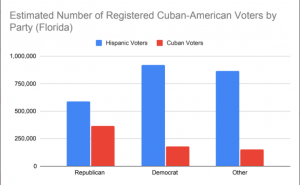
Secondly, Latino voters are not only Mexican immigrants. Latinos are a diverse population with voters of Mexican, Puerto Rican, Cuban or Venezuelan descent. There are even more identities which show that the perspective and views of Latinos, whether it be political or not, are a much broader range. It cannot be proven that all Latinos are in favor of the Democratic party, which contradicts speculations before and during the election.
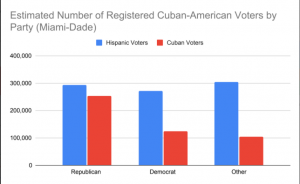
One example of this is the Cuban population which has generally supported the Republican party. Following Fidel Castro’s communistic presidency in Cuba, many Cuban immigrants identified as more conservative and less socialist within their political views. In a 2020 poll done by the Florida International University, it was found that despite the majority of Hispanics voting for a Democratic party, over half of Cubans had voted for the Republican party.
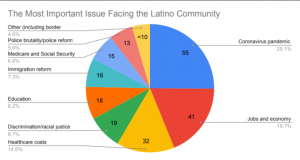
Nonetheless, assumptions were made going into the election. An example would be Latinos being biased against Trump for his response to illegal immigration. However, in a poll done by The American Election Eye Poll, it is estimated in a survey of 5,300 Latinos nationwide that Coronavirus was the most important issue facing the Latino community. As shown by the chart, “The Most Important Issue Facing the Latino Community”, discrimination, immigration reforms and border control were less thought of, each being less than 10%.
Political assumptions, such as the ones listed above, and the treatment of Latinos has caused harmful stereotypes and beliefs. Neuqua Valley sophomore Andres Lopez gave his insight on how those assumptions affect him.
Lopez, who identifies as Mexican-American, is also Mexica, a tribe of the Aztecs. He told me that he had “been called a ‘dirty Mexican’ on many occasions” and that many, including President Donald Trump, have “degraded the struggles and hardships many immigrants face in order to get to this country as they search for a better life.”
Lopez continues on saying that “not only has Trump made racist remarks on Mexicans and their way of life, but he also made it seem okay for others to say these things.” He has “learned to not be bothered by comments like those” and finds that “it is hurtful that those things are thought and said about my people.“
He described this year’s election as “very crazy” and expressed that the outcome of the election was beneficial towards the Latino community and others, saying that “if Trump served another term, many minority groups would fall deeper into the cycle of systematic oppression that has been going on for centuries.”
With all this being said, it is too early to determine if the “Sleeping Giants” have made a difference in the 2020 election by “waking up.” Nevertheless, the problem with the term “Sleeping Giants” is both political and ethical. Even if data and studies can be used to predict the presidential outcomes, elections cannot be dependent on one demographic, let alone the Latino community. It is unfair to assume how a racial group will vote and then create prejudices based on those assumptions. The name “Sleeping Giants” is just another hurtful belief of Latinos in the overall problem.



AbbyMMS • Dec 3, 2020 at 3:50 pm
This is so well researched and very thoughtful. Great article.